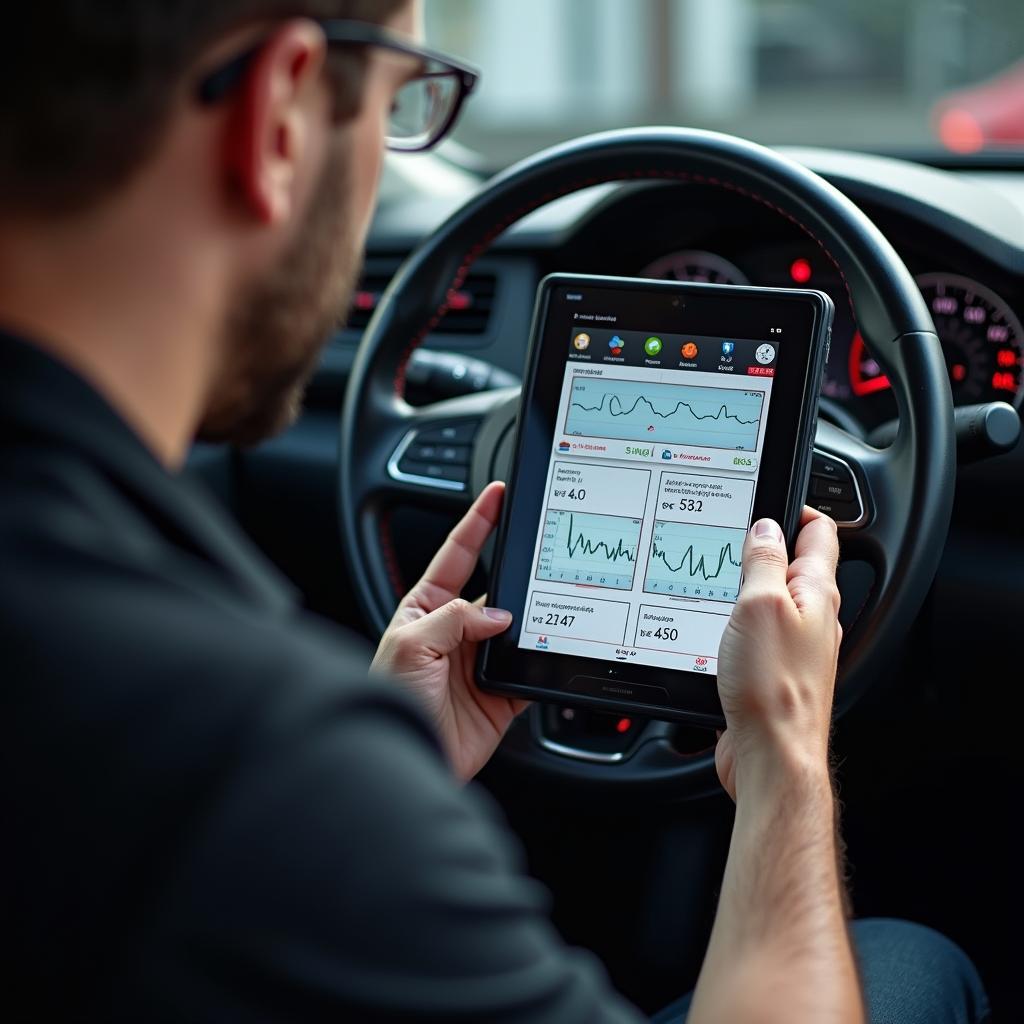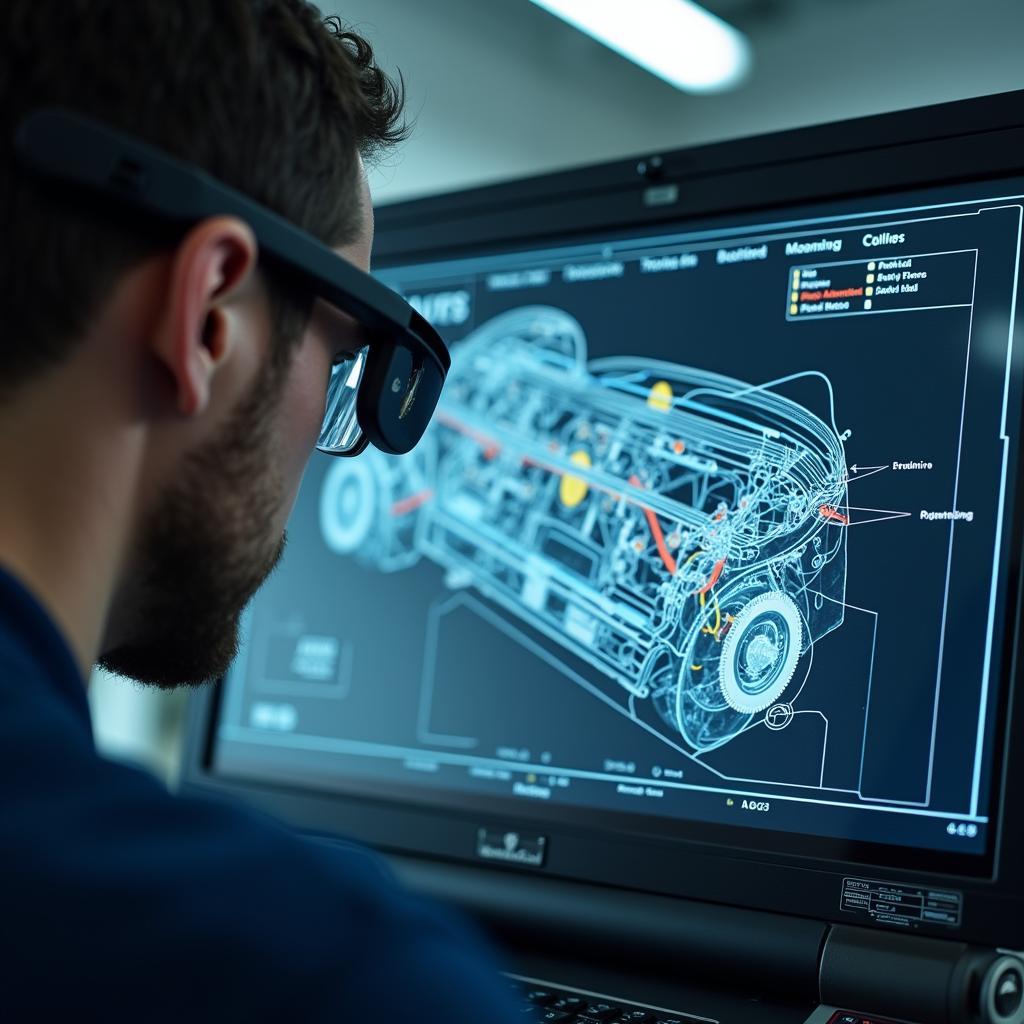Owning a Professional Diagnostic Tool For Cars was once a luxury reserved for mechanics. Today, these powerful devices are more accessible than ever, empowering car enthusiasts and professionals alike to diagnose and troubleshoot vehicle issues with ease. This comprehensive guide delves into the world of professional car diagnostic tools, exploring their benefits, features, and how to choose the right one for your needs.
Why Invest in a Professional Diagnostic Tool for Cars?
The modern vehicle is a complex network of electronic systems. When a problem arises, pinpointing the root cause can be challenging without the right tools. Here’s where a professional diagnostic tool proves invaluable:
- Accurate Diagnostics: Gone are the days of relying solely on guesswork. Professional diagnostic tools provide precise and in-depth information about your car’s health, allowing you to identify the root cause of issues quickly and efficiently.
- Cost Savings: Early detection of problems can save you significant money on repairs in the long run. By identifying minor issues before they escalate, you can avoid costly component failures and labor charges.
- Time Efficiency: No more endless trips to the mechanic for every warning light. With a professional diagnostic tool at your disposal, you can troubleshoot issues at your own pace, saving time and reducing downtime.
- Enhanced Control: Understanding your car’s inner workings empowers you to make informed decisions about maintenance and repairs. This control can lead to better care for your vehicle and potentially higher resale value.
- DIY Empowerment: For the automotive enthusiast, a professional diagnostic tool opens up a world of possibilities. It enables you to perform complex repairs and modifications yourself, giving you greater control over your vehicle.
Key Features to Look for in Professional Diagnostic Tools
Not all diagnostic tools are created equal. When making your selection, consider these essential features:
- Vehicle Coverage: Ensure the tool you choose is compatible with your car’s make, model, and year. Look for tools that offer broad vehicle coverage, especially if you work with multiple car brands.
- Diagnostic Capabilities: Different tools offer varying levels of diagnostic depth. Basic tools might only read and clear error codes, while advanced options offer live data streaming, bi-directional controls, and module coding.
- User Interface: A user-friendly interface is crucial, especially for beginners. Look for tools with intuitive menus, clear navigation, and easy-to-understand data displays.
- Software Updates: The automotive industry is constantly evolving. Choose a tool that receives regular software updates to ensure compatibility with the latest vehicle models and technologies.
- Durability and Portability: Consider the tool’s build quality and portability. A robust and compact design is essential for both professional and personal use.
Navigating the World of Professional Car Diagnostic Tools
The market offers a wide array of professional diagnostic tools, each catering to specific needs and budgets. Let’s explore some popular options:
1. Entry-Level OBD-II Scanners
These affordable and portable scanners are a great starting point for DIYers. They primarily focus on reading and clearing basic engine-related fault codes. While limited in functionality, they are an excellent first step into car diagnostics.
2. Professional Handheld Scanners
A step up from entry-level scanners, these tools offer more advanced features, including live data streaming, graphing capabilities, and some bi-directional controls. They are ideal for experienced DIYers and small workshops.
 Mechanic analyzing data from a professional car diagnostic tool on a tablet.
Mechanic analyzing data from a professional car diagnostic tool on a tablet.
3. High-End Diagnostic Systems
These comprehensive systems represent the pinnacle of car diagnostics. They offer unparalleled depth, providing access to multiple vehicle modules, advanced coding functions, and specialized tests. While expensive, they are indispensable for professional mechanics and dealerships.
Choosing the Right Tool for Your Needs
Selecting the ideal professional diagnostic tool depends on your individual requirements. Ask yourself:
- What is your budget?
- What level of diagnostic depth do you require?
- What car makes and models will you be working on?
- How comfortable are you with automotive technology?
Answering these questions will help you narrow down your choices and find the perfect tool for your needs.
The Future of Car Diagnostics: Embracing Technology
As vehicles become increasingly sophisticated, so too will the tools used to diagnose and repair them. Expect to see advancements in:
- Wireless Connectivity: Cloud-based diagnostics, remote diagnostics, and over-the-air software updates will become increasingly common.
- Artificial Intelligence: AI and machine learning algorithms will play a more significant role in analyzing diagnostic data and providing predictive maintenance suggestions.
- Augmented Reality: Imagine using augmented reality glasses to overlay diagnostic information directly onto your field of view while working on a vehicle.
Conclusion
Investing in a professional diagnostic tool for cars is no longer a luxury—it’s a smart investment for anyone who wants to take control of their vehicle’s health. From basic code readers to advanced diagnostic systems, there’s a tool available to meet every need and budget. By understanding the features, benefits, and evolving landscape of car diagnostics, you can make an informed decision that empowers you to maintain your vehicle with confidence. For a comprehensive selection of professional car diagnostic tools, be sure to visit professional car diagnostic tools.
 Futuristic car diagnostic interface with augmented reality features.
Futuristic car diagnostic interface with augmented reality features.
FAQs about Professional Diagnostic Tools for Cars
Q: Can I use a professional diagnostic tool on any car?
A: Not necessarily. Compatibility depends on the tool’s software and the vehicle’s make, model, and year. Be sure to check the tool’s specifications before purchasing.
Q: Do I need to be a mechanic to use a professional diagnostic tool?
A: While basic tools are user-friendly, more advanced features might require some technical knowledge. Numerous online resources and communities offer guidance and support.
Q: Can a diagnostic tool fix my car?
A: Diagnostic tools primarily identify problems. While some offer bi-directional controls to perform specific actions, they typically don’t fix issues on their own.
Q: How often should I use my diagnostic tool?
A: It’s recommended to scan your vehicle periodically, especially if you notice any unusual performance or warning lights.
Q: Can I update my diagnostic tool’s software?
A: Many reputable tools offer software updates to stay current with the latest vehicle technologies. Check the manufacturer’s website for updates and instructions.

Leave a Reply